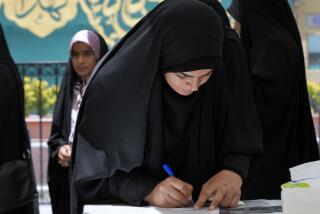Ahmadinejad says his reelection gave him a mandate
BEIRUT AND TEHRAN — Iranian President Mahmoud Ahmadinejad on Tuesday declared that his disputed reelection gave him a mandate to continue his domestic and international policies and spoke out defiantly against the West in a televised speech meant to shore up his legitimacy amid continued political turmoil.
But he softened his rhetoric toward his opponents at home, whom he had dismissed as sore losers after the June 12 vote.
“We have entered a new era in both the domestic sphere and at the international level,” he said. “Inside the country the path people are taking is clearer than before. And we will tread on that path more powerfully than before.”
During and after his speech, Iranians in various neighborhoods took to their rooftops to chant “God is great!” and “Death to the dictator!” in what has become a nightly demonstration against Ahmadinejad and in support of former Prime Minister Mir-Hossein Mousavi, his chief election rival. Mousavi posted a statement Tuesday on his website calling on the government to free prisoners swept up in a crackdown on those disputing the official vote results.
The dispute has opened the greatest rift within Iran’s political and religious establishment since the first years after the 1979 Islamic Revolution.
A prominent member of the powerful Society of Seminary Teachers of Qom, the most important clerical body in the Shiite holy city, Tuesday came out strongly in support of Ahmadinejad’s reelection, calling the vote a “benediction” for the Islamic establishment.
“The intelligence minister presented a report to Qom seminary teachers, assuring us that no irregularities could have taken place,” Ayatollah Morteza Moqtadai said in a statement carried by the semiofficial Iranian Students News Agency. He said supreme leader Ayatollah Ali Khamenei’s dismissal of vote-rigging charges was “the conclusive argument.”
However, another prominent conservative lashed out at Ahmadinejad for failing to listen to his critics.
“The recent happenings show that a sizable portion of the population, particularly the youths, were more interested in the opposition candidate,” said Askar Owladi, head of the hard-line Islamic Coalition Party, which is close to Khamenei. “Their voices should be heard.”
Ahmadinejad described the election as a “momentous” event that “was the freest and the healthiest election the world has ever seen,” setting a new start for Iran.
“People put their seal of approval to [my] four years in office,” he said.
He said those who said that the vote was rigged “failed to offer even a single piece of evidence,” though Mousavi recently released a 24-page document detailing accusations of fraud, and official photos of a partial recount effort showed hundreds of unfolded ballots, despite the requirement that voters fold their ballots.
Ahmadinejad blamed “arrogant” foreign enemies for doing “everything at their disposal to insinuate into the minds that the vote was tainted,” alleging that some Iranians collaborated with them.
The speech comes as Iranians brace for possible confrontations between demonstrators and security forces Thursday during unauthorized protest rallies scheduled around Iran to mark the 10th anniversary of an attack by pro-government militias on students at Tehran University. Arguing that pollution in the capital was at dangerous levels, authorities have declared the next few days a holiday, closed government offices and urged Iranians to get out of the capital for the sake of their health.
But Mashallah Shamsolvaezin, a reformist political analyst, said he thought Ahmadinejad’s speech would draw more protesters to the street.
“He claimed it was the freest and healthiest election and a role model for the world,” Shamsolvaezin said in a telephone interview. “On the contrary, it was the most agonizing election in Iran” for both sides of the political spectrum.
“It seems that Mr. Ahmadinejad is trying to utilize the method of telling a bigger lie to make it more believable,” he said.
--
Mostaghim is a special correspondent.
More to Read
Sign up for Essential California
The most important California stories and recommendations in your inbox every morning.
You may occasionally receive promotional content from the Los Angeles Times.








